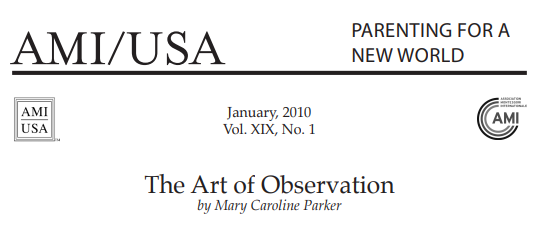The Art of Observation
December 9th, 2022
The art of observation: for most parents, it’s not about how to do something for your child, or how to do something to your child. Almost everything grown-ups do with children is about monitoring them. If we think about our interactions with children in terms of what the purpose is, we are almost always directing them, reminding them, correcting them, protecting them, or even lecturing them about something. We often try to take advantage of every possible opportunity to teach them something.
Stan Ferguson, therapist, counselor, and author of What Parents Need to Know About Children, estimates that about 99.9% of all adult communication with children is basically this kind of monitoring. Many parents might argue that this type of interaction is the responsibility of parenting. That’s what we signed up for – to love our children, nurture them, protect them, and show them the way.
It would be so interesting if someone could follow us around with a little notepad just for one day and write down everything we say to our child. It might come out something like this: Sweetie, it’s time to get up! Come on, sleepyhead, get a move on! You know you can’t wear that to school, so don’t even go there. What do you mean, you can’t find your socks? Hurry up, it’s time for breakfast. Quit playing with your cereal. Leave your brother alone. Did you brush your teeth? You’re going to be late for car pool. Don’t forget your lunch. Would you two quit bickering? No playing around after school or we’ll be late to your
dentist appointment. Yes, you have to go to the dentist. Because I said so, that’s why. Does this sound familiar? And all this before we ever leave the house in the morning!
The truth is that we’re just not used to spending time with our children without interacting with them. Lots of times we’re trying to make sure they don’t do something wrong. Or, if we’re not fast enough, we’re correcting them after they’ve already done something wrong. And if we’re not correcting them for doing something we don’t like, then we’re praising them for doing something we do like. It’s really kind of exhausting, always being on duty, isn’t it? It’s probably pretty exhausting for
the children, too.
What would it be like to be with our children without directing and controlling? What would it be like to just be present with that child, and what would it be like for the child? Ferguson calls this state of just being with your child “noticing” the child. Maria Montessori called it “observing” the child.
Continue reading the full The Art of Observation article HERE.







